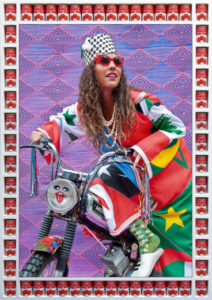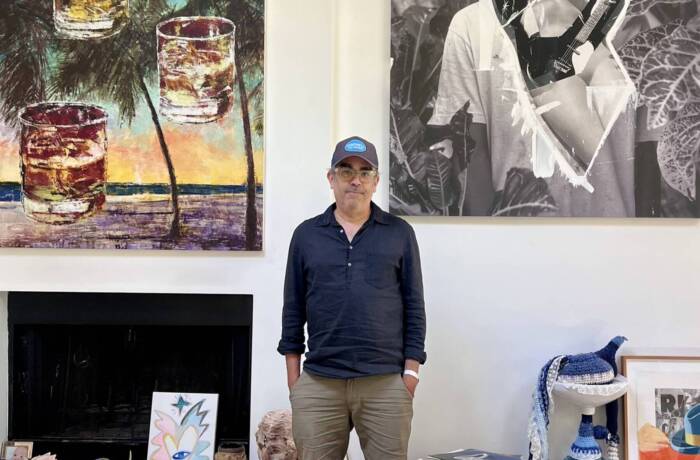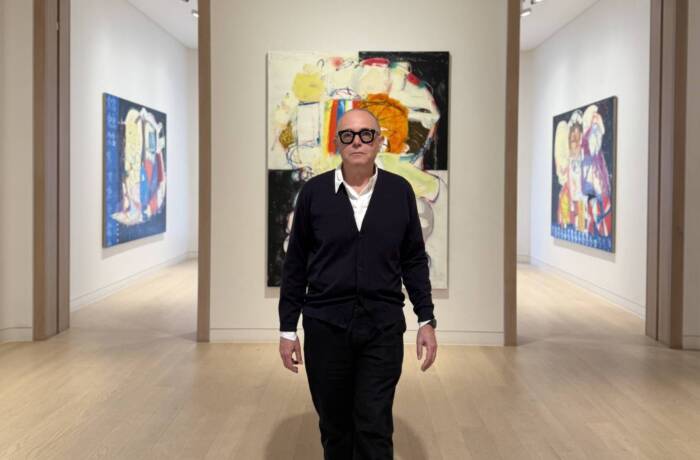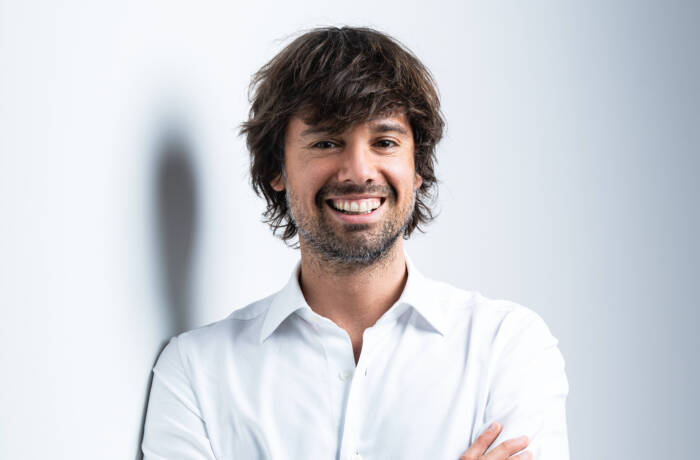
Alia Al-Senussi is an academic and global arts patron. Photograph by Anton Corbijn
Alia Al-Senussi grew up between Egypt, South Dakota, and Minnesota, and is now based in London where she works as a cultural strategist with a special focus on young patronage and culture within the Middle East. She is the Art Basel Representative for the UK and MENA, a senior advisor to the Ministry of Culture of Saudi Arabia and a guest lecturer at institutions such as Brown University and Sotheby’s Institute. Here, Al-Senussi discusses her philanthropic efforts, work in Saudi Arabia and belief in art as a catalyst for social change
LUX: What forms the basis of your passion for art and culture? When did this interest begin?
Alia Al-Senussi: I am passionate about contemporary art and supporting living artists. I focus mostly on Middle Eastern art and artists as this is close to my heart and my heritage. I very much hope I see the day when more artists of Middle Eastern origin are integrated in to the wider art world, and society looks past myopic views of political systems and embraces people, and the change they are trying to bring.
Follow LUX on Instagram: luxthemagazine
The first time I really understood what contemporary meant in the context of art was visiting Tate Modern in January 2004, and experiencing the life-changing work by Olafur Eliasson The Weather Project. It felt like an overwhelming moment: to gaze into this vast space and to see people treating a museum like a social space rather than a temple to worship art. In this way, art could change the way we see and the way we act—I became a believer.
Art provides an alternative discourse by which we can solve problems, promote heritage and instil a sense of national pride. My hope has been that by educating artists and patrons we can then educate the wider population on the benefits that art can bring to their everyday lives, not only beautifying the communities where we live, but also promoting more creative ways to solve problems, bridge differences and build community sentiment and strength.

H.R.H Alia, 2016, Hassan Hajjaj. Courtesy the artist
LUX: What is it about certain contemporary artists such as Manal Al Dowayan that so inspire you to champion them?
Alia Al-Senussi: In Saudi artists and patrons I see this deep commitment to art as a cornerstone of an evolving society. I am proud to be a part of this fascinating art world, and to help introduce more and more of my friends to Saudi culture, and to artists like Manal AlDowayan, Dana Awartani and Maha Malluh. These pioneers, of all ages, have been the voice of their society, as well as patriot activists. They are change-makers as well as cheerleaders, leading us all in to a brave new world.
Phil Tinari, a dear friend, and brilliant cultural leader, visited Saudi Arabia at my invitation in September 2019, and immediately understood what was unfolding. He has since agreed to work with me and our team at the Ministry of Culture, as the curator for the inaugural Ad-Diriyah Biennale. Collaborating with Phil has been a sustaining (and guiding) light in this year of uncertainty amidst Covid-19. Phil sent me this message the night he arrived to Riyadh, illustrating just how quickly he grasped the changes afoot – it is a quote from Václav Havel’s 1994 speech The Need for Transcendence in the Post-Modern World:
“Today, this state of mind or of the human world is called postmodernism. For me, a symbol of that state is a Bedouin mounted on a camel and clad in traditional robes under which he is wearing jeans, with a transistor radio in his hands and an ad for Coca-Cola on the camel’s back. I am not ridiculing this, nor am I shedding an intellectual tear over the commercial expansion of the West that destroys alien cultures. I see it rather as a typical expression of this multicultural era, a signal that an amalgamation of cultures is taking place. I see it as proof that something is happening, something is being born, that we are in a phase when one age is succeeding another, when everything is possible. Yes, everything is possible, because our civilisation does not have its own unified style, its own spirit, it’s own aesthetic.”

Al-Senussi with friends at Roden Crater. Photo courtesy Alia Al-Senussi.
LUX: The world is watching the next generation of Saudis and there is an optimistic outlook for women’s voices to be heard – how have you found your passion for politics, power and patronage is received among educated women of influence in Saudi?
Alia Al-Senussi: My work in Saudi Arabia has been multifaceted, as I have been part of the moment when this cultural community came together and continued to evolve. I was lucky to have been introduced to Saudi through family, and then friends, and to have been there at the first moments of a cultural reawakening almost two decades ago, helping to make connections amongst members of the community within and outside of the Kingdom. Women were then, and still are, at the forefront of culture and are change-makers at every level.
Read more: Life coach Simon Hodges on how to thrive in uncertainty
The idea that culture can change a community was instilled in me throughout my life, but never more so than through my work with Art Basel. I have been able to translate this to so many parts of my personal and professional lives. My colleagues at Art Basel and in Saudi embrace the belief that culture has power; that it is at the nexus of change and positive evolution.
LUX: You are renowned not only for your intellect, but also for your drive. How much of your time does chairing or founding patron groups take up?
Alia Al-Senussi: I actually think I fried brain cells rather than grew them getting my PhD! It certainly was an intellectual exercise, and one that made me realise how important it is to continuously exercise one’s mind, as well as emotions. My mother instilled in me a sense of honesty, integrity and work ethic. She taught me that one must not rest on history or title, but one’s own value and contributions to society. My maternal grandfather often discussed the value of “being a productive member of society.” I have taken these values to heart and strive to make a contribution, big or small, in any way I can through the work I do.
Most of my personal and professional time is taken up with activities in art and culture. I am fortunate that many of my friends are also intimately involved in the art world so I can share these fantastic and special experiences with them. It makes it a lot easier to keep busy with work when you do it with people you love and admire!

Al-Senussi at Mada’in Salih, an archaeological site located in the area of AlUla within Al Madinah Region in the Hejaz, Saudi Arabia. Photo courtesy Alia Al-Senussi.
LUX: What exactly is your role as Chair of the Tate Young Patrons, and how do you ensure you get optimum results?
Alia Al-Senussi: I served as Chair of the Tate Young Patrons for 5 years, and now sit on the Director- and Board- appointed Tate Modern Advisory Council as well as being a founding member of the Art Now Supporters Circle (Tate Britain). The Tate holds a very special place in my heart. It was one of the first institutions I got involved with in London, through the Young Patrons. Then the Middle East and North African Acquisitions Committee was launching and I was one of the first people on board. One thing led to another and I was asked to be a Young Patrons Ambassador, and also to represent the Young Patrons on the advisory board of the Tate. I feel like the Tate is family and also that I have a responsibility to help it evolve and grow, not just in London, but in the Middle East also, and in terms of its role in society, particularly at this fractious time.
LUX: Can you tell us a little about your work with Delfina Foundation?
Alia Al-Senussi: ‘A rising tide lifts all boats’ – that is my motto, and one that I see embodied in the work of Aaron Cezar in his role as Director of Delfina Foundation. Aaron, and the foundation, are unlike any other. Delfina is a home, not just at its physical space in London, but also throughout the world whenever you come across residents (artists, curators and collectors). Delfina Foundation is a safe haven, and Aaron is the ultimate angel, providing solace and shepherding our entire community to embrace new concepts while breaking down the intellectual barriers that keep us apart.
Read more: Juanita Ingram on empowering women in the workplace
LUX: What are your proudest achievements?
Alia Al-Senussi: I discovered my passion for art and the art world by chance. Upon graduating with my MsC from LSE, some friends recommended that I meet Michael Hue-Williams to work on a project he had created in Siwa, Egypt, with the world-renowned artists Ilya and Emilia Kabakov.
I had never worked in the arts, but as I had an interest for non-governmental organisations working in the Middle East, I thought this would be an interesting first job for me. Also, the fact that Siwa bordered Libya was particularly poignant.
In the end, it was fate and I fell in love with art, the art world and everything about it. I saw it as being a perfect way for me to balance my interest in political science, international relations and the history of the Middle East with a “softer” way of approaching the difficult issues facing the region.
My entire life is shaped by this first art world experience, and by the belief that an international cosmopolitan world is a better one. Every time I make an introduction, conceive a project or bring people somewhere new, I feel a deep sense of pride – the world shrinks that tiny bit more and we learn more about our neighbours and about humanity.
LUX: How will COVID-19 affect what do you do?
Alia Al-Senussi: I hope, and fervently believe, that people will realise the importance of culture in this new and renewed world. Of course things are moving online in the short term, and I believe that this means we can share our shows and messages with a wider audience and hopefully make them want to come see things in real life. Art Basel provided me, and so many, with an online community, but this was not a substitute for the thrill of interacting with people, swapping stories, having fun and experiences in Hong Kong, Miami and Basel.

Al-Senussi at The Lightning Field.
LUX: We know you have been passionately engaged with the US election process and we would love you to share with us a few ways you think the result will benefit the work of your partners over the next four years.
Alia Al-Senussi: I have decided to embrace beauty. I also have committed myself to art and artists that reflect my values, and who work to effect positive change in their worlds, and in mine.
A large part of my Libyan identity was actually shaped by my mother, an American of Scandinavian-German origin who grew up in Worthington, Minnesota. My mother studied International History for her Bachelor’s degree in Minnesota. She fell in love with Middle Eastern culture so upon graduating decided to pursue a Master’s at the American University of Cairo. It was in Cairo that she met my father.
My American identity is inextricably linked to my Libyan heritage, to my belief in an international cosmopolitan world, and to the life I have built for myself in London, the Middle East and Asia. Everything I held dear was shattered in 2016, by others’ small-minded desire to isolate ourselves from the “other” in the US and the UK. I couldn’t imagine that was the world I was living in. How could my community reject the essence of me in such a way? My friends bundled me up, helped me to heal and gave me my marching orders (literally!). Going to the Women’s March in Washington was a therapeutic moment, and now four years later I see the change again, and I am hopeful we can rebuild and evolve by making a world that is more equitable and by embracing the ideals that I hold dear.
LUX: Any other advice for our readers who might be considering going into art philanthropy?
Alia Al-Senussi: Artists, collectors and institutions are becoming more aware, and truly taking ownership of their ability to be change-makers. I applaud institutions like the Tate that are working to accurately reflect our world in their galleries—a global cosmopolitan world.
Fill yourself with passion, surround yourself with people you admire and embrace the idea of what is right, rejecting what is wrong. As mentioned before, a rising tide lifts all boats, so make sure your community rises with you.
Follow Ali Al-Senussi on LinkedIn: linkedin.com/in/alia-al-senussi








